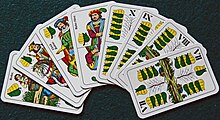Trex, pronounced Tricks or Trix, and also known as Ticks, is a four-player Middle Eastern card game mainly played in the Levant region. Similar to European games like Barbu, Herzeln, Kein Stich or Quodlibet, Trex is a compendium game in which there are four rounds with each round consisting of five games. Each cycle is called a "kingdom" in reference to the fact that in each cycle one player determines which contract to play in each of the five games.
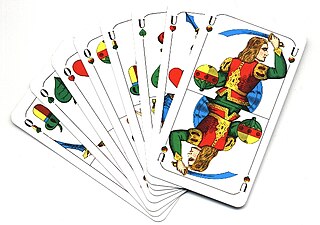
Schafkopf, also called Bavarian Schafkopf, is a popular German trick-taking card game of the Ace-Ten family for four players that evolved, towards the end of the 19th century, from German Schafkopf. It is still very popular in Bavaria, where it is their national card game played by around two million people, but it also played elsewhere in Germany and in Austria. It is an official cultural asset and important part of the Old Bavarian and Franconian way of life. Schafkopf is a mentally demanding pastime that is considered "the supreme discipline of Bavarian card games" and "the mother of all trump games."
Ramsch, formerly also called Mike in East Germany, is a card game based on the contract of the same name in the popular German card games, Skat and Schafkopf. However, thanks to its interesting mode of play it has since developed into an independent game in its own right which is only loosely based on Skat or Schafkopf. It should not be confused with the games of the Rams family – Ramsen and Ramscheln – that also go by the name Ramsch.

The card game of Bauernschnapsen is an expanded form of the popular Austrian card game of Schnapsen, played by four players. This variant of Schnapsen is played throughout the whole of Austria.

Dreierschnapsen, Talonschnapsen or Staperlschnapsen is a three-hand variant of the popular Austrian card game, Bauernschnapsen. The rules are very similar to those for Bauernschnapsen except that, instead of two teams of two players, one player bids to become the soloist against the other two who form a temporary alliance. Another difference is that the game makes use of a talon with which the soloist may exchange cards to improve his hand, hence its alternative name of Talonschnapsen. The game is usually played with William Tell cards.
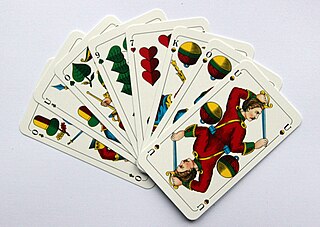
Mucken or Muck is a variation of the popular German card game, Schafkopf. However, unlike Schafkopf, it must always be played in teams of 2 players, so there are no soloist or Rufer ("caller") contracts. Mucken is mainly found in the province of Upper Franconia in the German state of Bavaria. Mucken is often played in Franconian restaurants, as it is part of the Franconian pub culture. The details of the rules vary greatly, even from village to village.

Binokel is a card game for two to eight players that originated in Switzerland as Binocle, but spread to the German state of Württemberg, where it is typically played with a Württemberg pattern pack. It is still popular in Württemberg, where it is usually played in groups of three or four as a family game rather than in the pubs. In three-hand games, each player competes for himself, while in four-hand games, known as Cross Binokel (Kreuzbinokel), two teams are formed with partners sitting opposite one another. The game was introduced to America by German immigrants in the first half of the 20th century, where it developed into the similar game of pinochle. Binocle was still played in Switzerland in 1994. In south Germany, the game is sometimes called by its Swabian name, Benoggl.

Grasobern, Grasoberl, Grasoberln, Graseberla, Grünobern, Lauboberl or Laubobern is a card game that was once commonly played in Old Bavaria, especially in the old counties of Bad Aibling and Rosenheim, and is still popular in eastern Bavaria, especially in Upper Palatinate. The game has relatively simple rules and thus a rather relaxing and leisurely character without the mental demands of Schafkopf or psychological stress of Watten, two other traditional Bavarian card games. The name is taken from the game's penalty card, the Ober of Leaves. The suit of Leaves is known in German variously as Laub, Gras ("grass") or Grün ("green").

Blattla is a Bavarian card game for four players, who usually form two teams of two for each deal. It is a simplified version of Schafkopf and Bierkopf and is thus a point-trick game. Unlike those two games, in Blattla the Obers and Unters are not permanent trumps. In order to learn the rules of Schafkopf, it can be an advantage to first become familiar with Blattla. The game is traditionally played with Bavarian pattern cards.

Herzeln is a compendium card game for three or four players in a partie of eight deals. As its name suggests, it is an Austrian game. It should not be confused with other games sometimes called Herzeln, including Barbu and Kein Stich.

Rumpel is a card game, that is native to the Danube region from Regensburg to Linz, but is played especially in the region of Hauzenberg in the German county of Passau in Bavaria. Mala describes a version with 8 or 12 contracts from a menu of 29 called Großer Rumpel. It is a descendant of the old Austrian student's game of Quodlibet.

Rosbiratschka is a trick-taking, compendium, card game for three or four players that is played with a German-suited pack of 32 or 24 cards.
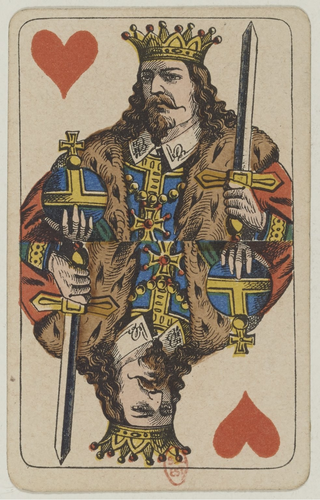
Kein Stich is a card game, which is well known in the German-speaking parts of the world under various regional names such as Herzeln, King Louis, Kunterbunt ("Multicoloured"), Schwarze Sau, Fritz, Brumseln, Fünferspiel ("Fives"), Lieschen, Lizzy or Pensionisteln ("Pensioners").

Ramsen or Ramsch is a traditional Bavarian plain-trick, card game for three to five players that is played with a 32-card German-suited pack and is suitable both for adults and for children. It is one of the Rams group of card games that are distinguished by allowing players to drop out if they think they will fail to win the required number of tricks. An unusual feature of Ramsen is the presence of four permanent trump cards that rank just below the Trump Sow (Ace). It should not be confused with the contract of Ramsch in games like Skat or Schafkopf, nor with the related game of Rams which is also called Ramsenin Austria, but is played with a Piquet pack, does not have permanent trumps and has a different card ranking.
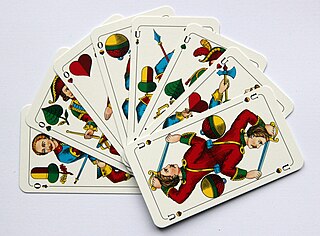
Bierkopf ("Beer-head") is a trick-taking, Ace-Ten, card game for 4 players, played in fixed partnerships. It is a simple version of the Bavarian national game of Schafkopf that is played in Franconia and usually for litre-glasses of beer. It is especially popular in the area of Bamburg. The game is popular enough for regular tournaments to be held.
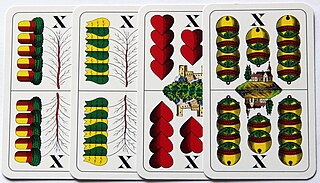
Matzlfangen is a traditional point-trick, card game for 4 players that originated in the Bavarian province of Upper Palatinate over 200 years ago and spread to Austria. It is still played in a few places today. The game is named after the Ten or Matzl, which plays a key role.
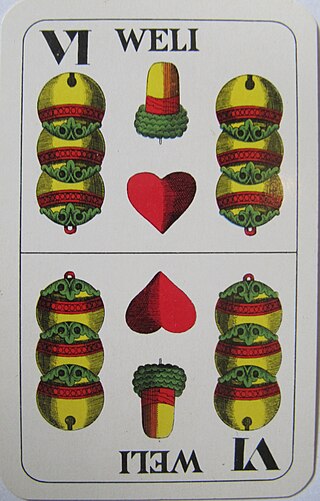
Schnalzen is an Austrian card game for 4 players and a member of the Rams group of games in which the key feature is that players may choose to drop out of the game if they believe their hand is not strong enough to take a minimum number of tricks. It is, broadly speaking, Ramsen with the Weli as the second-highest trump. Players are dealt 5 cards and may not exchange. The Weli is the second-highest trump and game is 20 points.

Officers' Schafkopf is a German point-trick, card game for two players which is based on the rules of Schafkopf. The game is a good way to learn the trumps and suits for normal Schafkopf and to understand what cards one is allowed to play. It is similar in concept to Officers' Skat.

Lorum or Lórum is an old, Hungarian, compendium card game for 4 players. Although it is the ancestor of the French game, Barbu, it is still played today. It uses a German-suited pack of 32 cards and comprises 8 individual contracts, each with different rules, each of which is played four times so that a session consists of a total of 32 individual games and lasts about 1½ hours.
Schlauch is an extinct Bavarian point-trick card game that was popular in the mid-19th century as a drinking game, hence it was also known as Bier-Schlauch.
